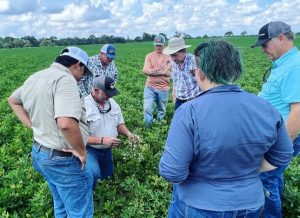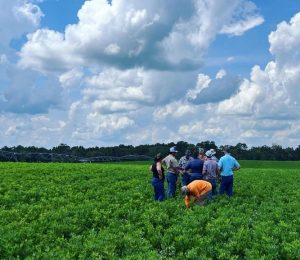For several years, researchers and Extension agents at North Florida Research and Education Center- Suwannee Valley (NFREC-SV) have conducted field days at the center to educate stakeholders on best management practices (BMPs) and showcase research advancements in the field of agriculture. Field days, in recent years, have often conflicted with farmers’ busy schedules, as many are unable to take an entire day away from their work to attend. In 2023, NFREC-SV initiated a new program named Reverse Field Day, where a team of Extension specialists and agents travel to farms. This allows for higher engagement and a more specialized approach to the farmer’s needs. In the first year, we had three reverse field days covering 3 counties and 10 farms. Those showcased production agriculture including peanuts, corn, and dairy. These farms ranged from smaller producers with approximately 300 acres to large producers growing up to 10,000 acres. An array of specialists participated in these field days including agronomists, pathologists, entomologists, economists, and nematologists from the University of Florida.

Benefits of Reverse Field Days
At these reverse field days, specialists were able to speak one-on-one with farmers and look at the crops directly. This proved to be a learning experience for both the growers, our Extension agents, and specialists. Our researchers were provided the opportunity to see firsthand the situations growers deal with. The experience gave them new research questions to investigate.
As opposed to our traditional field day, the Reverse Field Day allows farmers to have a group of specialists at their doorstep, who can offer dedicated time and on the spot solutions. By doing so, we also help to foster a more trusting and personal relationship with the local community. This program got 100% positive feedback from farmers, county agents, commodity groups, regulators, and researchers. Farmers expressed that the guidance they received during the Reverse Field Day was helpful in adoption of new best management practices, such as side dressing fertilizer, implementation of soil moisture sensors, and more.

Importance of Engagement
By actively involving our audience in demonstrations, the Reverse Field Day can help build trust, encourage collaborative problem-solving, and empower growers to adopt best management practices. In doing so, it fulfills the University of Florida’s land grant mission of extending research and knowledge to the public while driving behavior changes and supporting the long-term sustainability of Florida’s agricultural and environmental systems.
Rethinking Outreach: How Reverse Field Days Enhance Engagement and Drive Adoption of Best Management Practices
Authors: Taite Miller, Sydney Williams, Shivendra Kumar, and Bob Hochmuth
University of Florida, Institute of Food and Agricultural Sciences
North Florida Research and Education Center- Suwannee Valley
7580 County Road 136 Live Oak, FL 32060
 3
3
